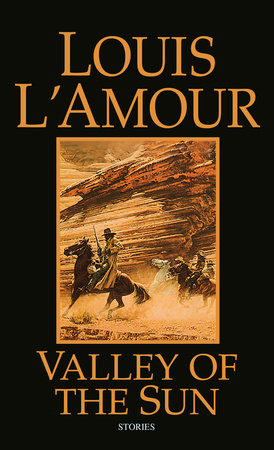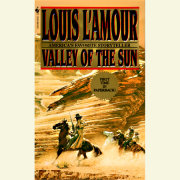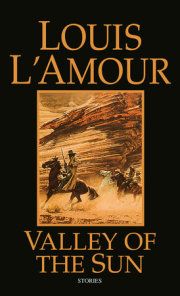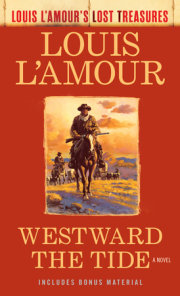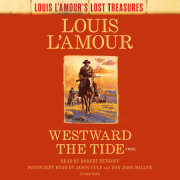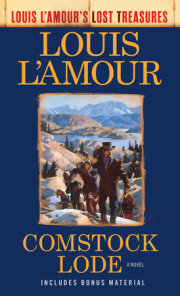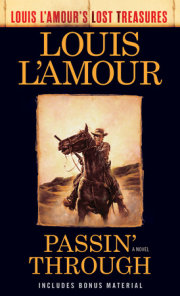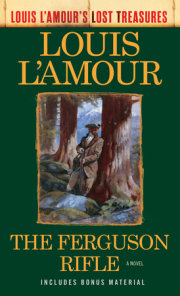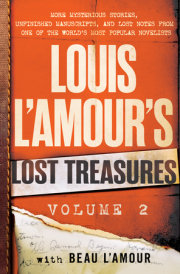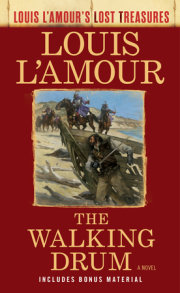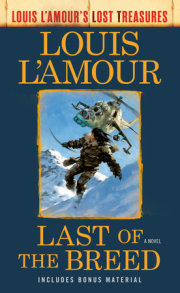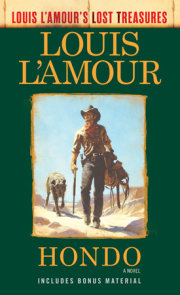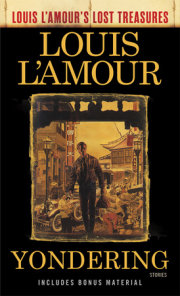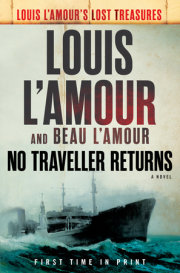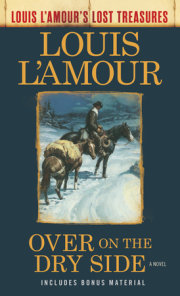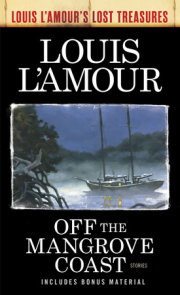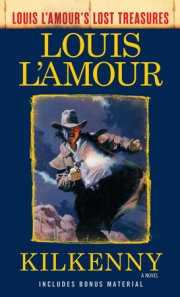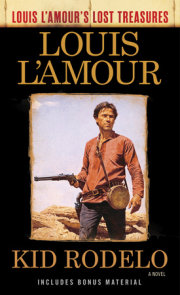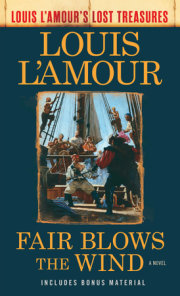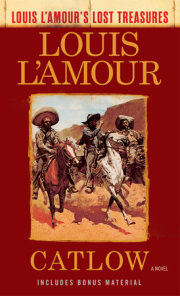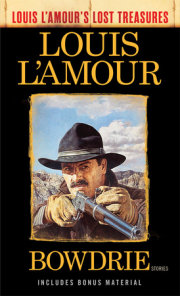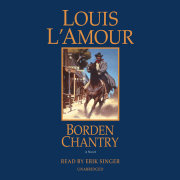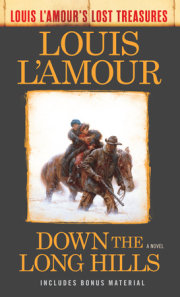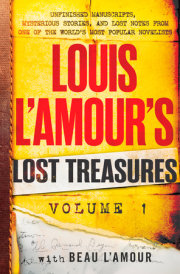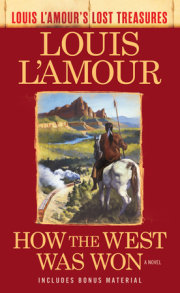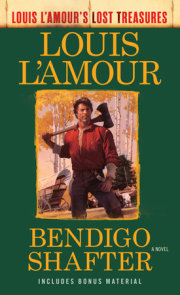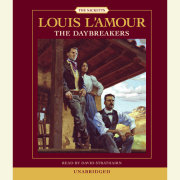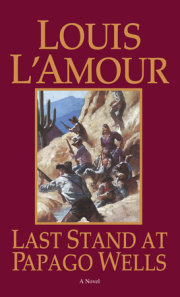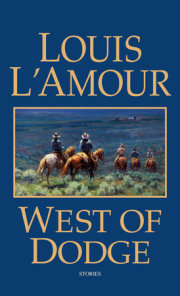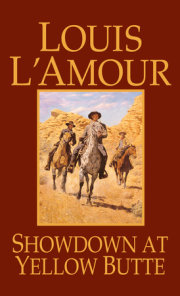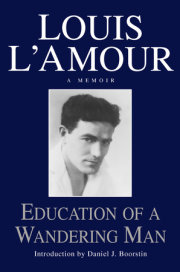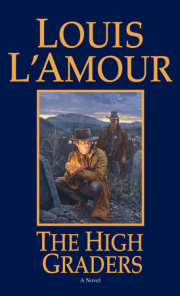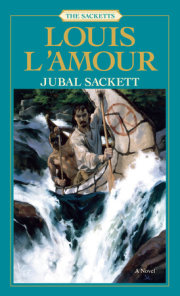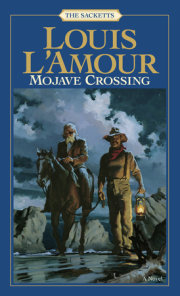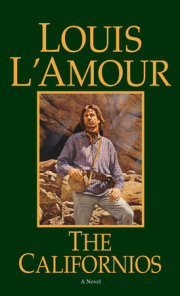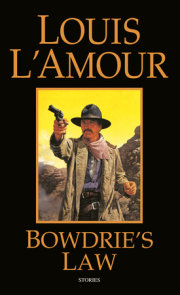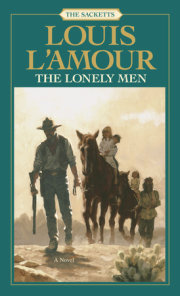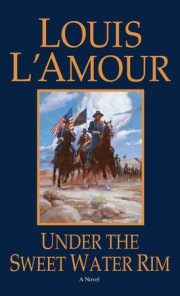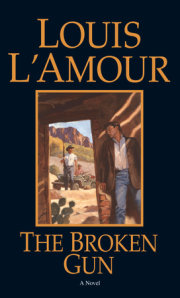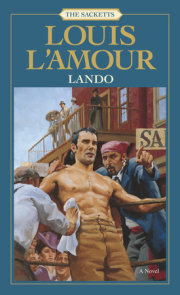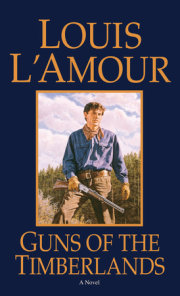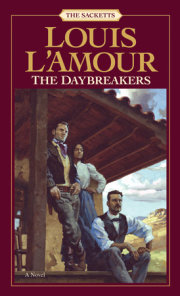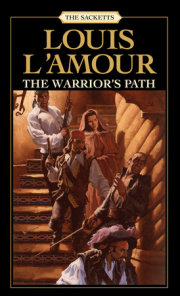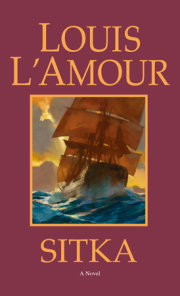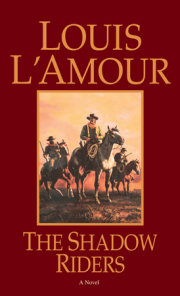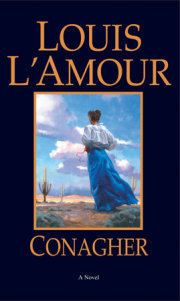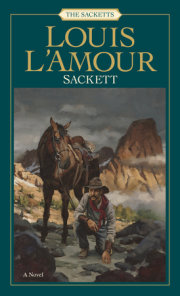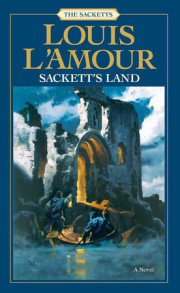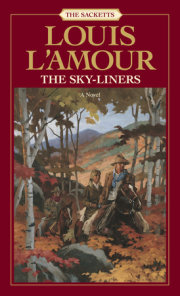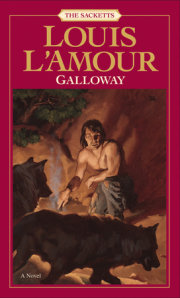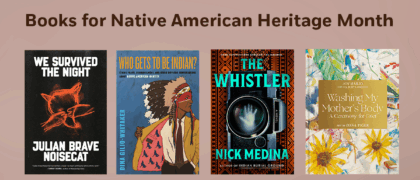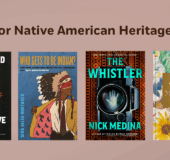WE SHAPED THE LAND WITH OUR GUNS
WE MOVED INTO the place on South Fork just before the snow went off. We had a hundred head of cattle gathered from the canyons along the Goodnight Trail, stray stuff from cattle outfits moving north. Most of these cattle had been back in the breaks for a couple of years and rounding them up was man-killing labor, but we slapped our iron on them and headed west.
Grass was showing green through the snow when we got there and the cattle made themselves right at home. Mountains to the east and north formed the base of a triangle of which the sides were shaped by creeks and the apex by the junction of those creeks. It was a good four miles from that apex to the spot we chose for our home place, so we had all natural boundaries with good grass and water. There were trees enough for fuel and shade.
The first two weeks we worked fourteen hours a day building a cabin, cleaning out springs and throwing up a stable, pole corrals, and a smokehouse. We had brought supplies with us and we pieced them out with what game we could shoot. By the time we had our building done, our stock had decided they were home and were fattening up in fine shape.
We had been riding together for more than six months, which isn’t long to know a man you go partners with. Tap Henry was a shade over thirty while I had just turned twenty-two when we hit the South Fork. We had met working for the Gadsen outfit, which took me on just west of Mobeetie while Tap joined up a ways farther north. Both of us were a mite touchy but we hit it off right from the start.
TAP HENRY SHOWED me the kind of man he was before we had been together three days. Some no-account riders had braced us to cut the herd, and their papers didn’t look good to me nor to Tap. We were riding point when these fellers came up, and Tap didn’t wait for the boss. He just told them it was tough, but they weren’t cutting this herd. That led to words and one of these guys reached. Tap downed him and that was that.
He was a pusher, Tap was. When trouble showed up he didn’t sidestep or wait for it. He walked right into the middle and kept crowding until the trouble either backed down or came through. Tall and straight standing, he was a fine, upright sort of man except for maybe a mite of hardness around the eyes and mouth.
My home country was the Big Bend of Texas but most of my life had been lived south of the border. After I was sixteen the climate sort of agreed with me better. Tap drifted toward me one night when we were riding herd up in Wyoming.
“Rye,” he said, that being a nickname for Ryan Tyler, “an hombre could go down in those breaks along the Goodnight Trail and sweep together a nice herd. Every outfit that ever come over this trail has lost stock, and lots of it is still back there.”
“Uh-huh,” I said, “and I know just the right spot for a ranch. Good grass, plenty of water and game.” Then I told him about this place under the Pelado and he liked the sound of it. Whether he had any reason for liking an out-of-the-way place, I don’t know. Me, I had plenty of reason, but I knew going back there might lead to trouble.
Two men can work together a long time without really knowing much about one another, and that was the way with me and Tap. We’d been in a couple of Comanche fights together and one with a Sioux war party. We worked together, both of us top hands and neither of us a shirker, and after a while we got a sort of mutual respect, although nobody could say we really liked each other.
Our first month was just ending when Jim Lucas showed up. We had been expecting him because we had seen a lot of Bar L cattle, and had run a couple of hundred head off our triangle of range when we first settled. He was not hunting us this day because his daughter was with him, and only one hand. Red, the puncher, had a lean face and a lantern jaw with cold gray eyes and two low, tied-down guns.
Lucas was a medium-built man who carried himself like he weighed a ton. He sat square and solid in the saddle, and you could see at a glance that he figured he was some shakes. Betty was eighteen that summer, slim but rounded, tan but lovely, with hair a golden web that tangled the sunlight. She had lips quick to laugh and the kind that looked easy to kiss. That morning she was wearing homespun jeans and a shirt like a boy, but no boy ever filled it out like she did.
Right off I spotted Red for a cold ticket to trouble. He stopped his horse off to one side, ready for disturbances.
“Howdy!” I straightened up from a dam I was building across a beginning wash. “Riding far?”
“That’s my question.” Lucas looked me over mighty cool. Maybe I looked like a sprout to him. While I’m nigh six feet tall I’m built slim and my curly hair makes me look younger than I am. “My outfit’s the Bar L, and this is my graze.”
Tap Henry had turned away from the corral and walked down toward us. His eyes went from Lucas to the redhead and back. Me, I was off to one side. Tap wore his gun tied down but I carried mine shoved into my waistband.
“We’re not riding,” Tap replied, “we’re staying. We’re claiming all the range from the creeks to the Pelado.”
“Sorry, boys”—Lucas was still friendly although his voice had taken on a chill, “that’s all my range and I wasn’t planning on giving any of it up. Besides”—he never took his eyes off Tap Henry—“I notice a lot of vented brands on your cattle. All I saw, in fact.”
“See any of yours?” Tap was quiet. Knowing how touchy he could be, I was worried and surprised at the same time. This was one fight he wasn’t pushing and I was sure glad of it.
“No, I didn’t,” Lucas admitted, “but that’s neither here nor there. We don’t like outfits that stock vented brands.”
“Meaning anything in particular?” Tap asked.
Quiet as he was, there was a veiled threat in his tone now and Jim Lucas seemed suddenly to realize that his daughter sat beside him. Also, for the first time he seemed to understand that he was dealing with a different kind of man than he had believed.
“Meaning only,” he said carefully, “that we don’t like careless brands on this range or small outfits that start that way.”
Tap was reasonable. More so than I had expected. “We rounded those cattle up,” he explained, “from the canyons along the Goodnight. They are abandoned trail herd stock, and we got letters from three of the biggest outfits giving us title to all of their stuff we can find. Most of the other brands are closed out or in Montana. We aim to run this stock and its increase.”
“Maybe. But run it somewheres else. This is my range. Get off it.”
“Maybe you take in too much territory?” Tap suggested. “My partner and I aren’t hunting trouble, but I don’t reckon you hold any deed to this land from the government, the people, or God. You just laid claim to it. We figure you got your hands full, and we lay claim to the triangle of range described.”
“Boss,” Red interrupted, “I’ve seen this hombre somewhere before.”
Tap did not change expression but it seemed to me that his face went a shade whiter under the tan. Betty was looking worried and several times she had started as if to interrupt.
“We can be neighbors,” Tap persisted. “We wanted our own outfit. Now we’ve got it and we intend to keep it.”
Copyright © 2004 by Louis L'Amour. All rights reserved. No part of this excerpt may be reproduced or reprinted without permission in writing from the publisher.

